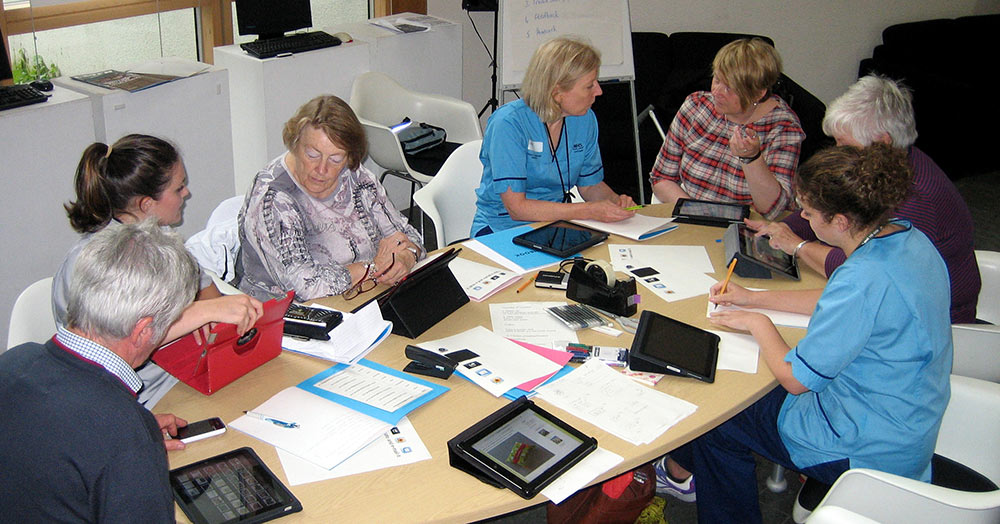This is a guest blog from Sally Dyson, Head of Digital Participation at our friends SCVO. Sally writes about the work SCVO are doing to tackle digital exclusion.
Most of us find the internet an essential part of daily life. It is too easy to forget about the minority that are at risk of being left behind. Over the past year, growth in internet use has stalled in Scotland. This suggests that all those who want to be connected, can get a connection and afford the cost, have done so.
The profile of people who do not have basic digital skills is unsurprisingly similar to that of those who are offline: older people, people with disabilities and people on low incomes.
There are clear economic benefits of getting online both for those not online and for society as a whole. Not only are some of the cheapest products and services only available online but also 90% of jobs in all industries require people to have good levels of basic digital skills.
Not being online contributes towards the ‘poverty premium’; shorthand for the fact that lower income households often have to pay higher prices for basic necessities like gas, electricity and banking than better-off families. Research shows that an average household saves around £750 per year by being online.
There are also particular challenges around those needing to claim benefits or apply for jobs. The Department for Work and Pensions had previously created a target for 80% of Jobseekers Allowance claims to be made online by September 2013. The replacement Universal Credit service, which rolls six existing benefits (housing benefit, income support, Jobseekers Allowance, employment and support allowance, child tax credits and working tax credits) into one is ‘digital first’. This service is going through a staged roll-out, with Glasgow being the final area in Scotland to make the transition in September 2018.
However, even the 2013 target for online access looks challenging when applied to a wider range of benefits, given those claiming are also amongst the most likely to be digitally excluded. Recent evidence from a Citizens Advice Bureau (CAB) survey showed:
- Only slightly more than half of clients (54%) had an internet connection at home
- 36% reported that they never used the internet and a further 11% related that they hardly ever did so
- Only a quarter (24%) of respondents would feel confident in applying for benefits online; and
- Nearly three-quarters (72%) said that they would struggle to apply for a job online.
Amongst jobseekers, confidence online decreases with age, markedly from the age of 45. These people currently have at least twenty more years to be in the workplace.
Evidence from other research shows that those in receipt of benefits – and who are therefore either (or in combination) unemployed, unwell or in receipt of a low wage – are among the least likely to be able to access information and opportunities online. Given these people are most likely to need support from public services, it highlights the continuing need to consider how to build digital confidence and skills.
Additionally, with local access points, such as Job Centre Plus and libraries, being centralised or closed – the issues around affordable local access to the internet, through a range of devices, are important considerations in the future development of digital public services.
With the support of the Scottish Government, BT and European Structural Funds, we have invested over £1m in 126 local projects across Scotland, enabling over 15,000 people facing multiple barriers to get online and develop their skills. Our review of these projects, together with the wider evidence base on tackling digital exclusion, shows that the formula for engaging people successfully is:
- Recognising that motivation to learn something new is unique to an individual;
- Hooking people in through a personal interest;
- Facilitating invaluable peer support; and
- Embedding all of this in a service currently being accessed, when people can see an immediate practical application.
In Scotland, the Digital Participation Charter was set up to develop a national movement to tackle digital exclusion by embedding this in the day-to-day work of organisations across the public, private and third sectors. Over 400 organisations have committed to action, from building the skills of their workforce to making free internet access more widely available to help customers to get online.
To ensure that the internet is truly for everyone, we would encourage all organisations who work with people who are older, poorer, have a disability or face other forms of social exclusion to consider how they might contribute to building basic digital skills and confidence, learning from the evidence of what works.

